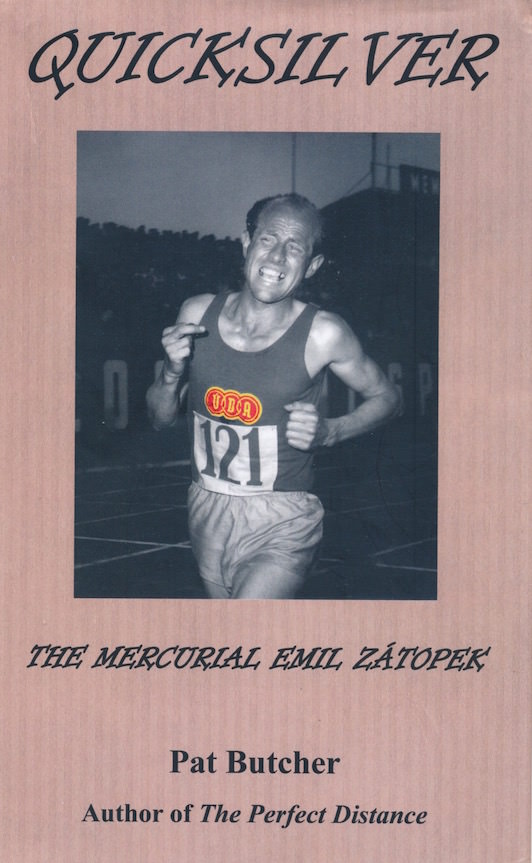Book Review: Quicksilver: The Mercurial Emil Zatopek
by Pat Butcher 705w
Globerunner Productions, 2016. 209pp.
 |
The late Emil Zatopek ranks as one of the most inspirational figures in the history of track. He inspired us not only as a competitor but also as an innovative trainer and as a human being. Such was his stature that a regular number of “pilgrims” used to travel to Czechoslovakia to meet him. So it is surprising that until 2015 only three books on him had been published (See my book review “Three Books on Zatopek”) However, there has been a veritable deluge of Zatopek books in the last year. First to appear was Pavel Kosatik’s Emil-Bezec, which was written in the Czech language. Then early in 2016 two more were published: Today We Die a Little: The Rise and Fall of Emil Zatopek, Olympic Legend by Richard Askwith and Endurance: The Extraordinary Life and Times of Emil Zatopek by Rick Broadbent. Later in 2016 a fourth book appeared: Quicksilver: the Mercurial Emil Zatopek by Pat Butcher.
Butcher is well known in running circles as a knowledgeable and empathetic writer. Best known for his The Perfect Distance (2004) that describes the Coe-Ovett rivalry and for his Globerunner website, he has been publishing for 35 years. He is therefore well qualified to write about Zatopek. But he didn’t depend solely on his qualifications; he also spent a lot of time in the Czech Republic meeting with those who knew Zatopek in the various stages of his life and most importantly talking to the runner’s wife Dana. It was in talking to her that he discovered the existence of yet another book, an autobiography by both Emil and Dana. The book was in Czech, so it had to be translated, but it turned out to be a great find. Quicksilver is full of valuable quotes from this little-known autobiography.
Quicksilver is not a conventional biography. Rather it’s a series of 64 brief essays. A few these essays touch on Zatopek’s races, but most focus on other aspects of his life. Indeed, close to a third of the book deals with Zatopek after his retirement from competition. There is surprisingly little on his running (although there’s a fine six-page chapter on his training); rather Butcher focuses on Zatopek’s character and his political environment. Since there have already been five biographies, this different focus was a smart move. In short, Butcher tries to capture the essence of the great Czech by looking at him from many different angles.
The 64 essays are ordered in a discernible chronological order, but there are many digressions that provide excellent background for understanding Zatopek’s life and character. For example, there are chapters on his wife Dana, on his friend and rival Alain Mimoun, on Czechoslovakia in WW2, on post-war Czechoslovakia, on the significance of left-handedness and birth dates, on professionalism, and on track romances. Butcher does of course cover Zatopek’s competitive career, but he presumes that his reader has already read about all the great races and world records.
What makes Quicksilver especially valuable is Butcher’s research. He spent a lot of time researching Zatopek’s country. He managed to meet the great man before his death in 2000, returning later to interview Dana. It is amazing that after more than half a century he was able to find three of Zatopek’s training partners. He also managed to interview two men who worked with Zatopek in the uranium mine after the 1968 Soviet invasion. His research also spreads to other languages; a 1954 article from the Italian magazine Il Tempo has some valuable information on Zatopek’s training methods.
Butcher writes in an engaging personal style. His first few chapters narrate his own experiences. First of all he recounts his visit to the Zatopek home when he met “an old man with ruddy features and gleaming eyes.” Following this Butcher explains why he chose to write this book and then goes on to compare Zatopek to his own father. Clearly Quicksilver was a very important project for the much-published Butcher.
So this is a valuable book for those who have already read one of the more conventional biographies. It is valuable because it provides original material and gives a vivid picture of Emil Zatopek’s unique personality.
Highly recommended.
Leave a Comment